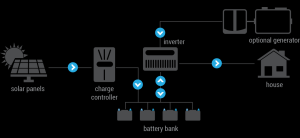Innovations in Lithium Ion Battery Manufacturing and Materials Science
Lithium ion batteries are widely used in various devices and systems due to their high energy density, lightweight components, and long-lasting charge. Lithium ion battery performance, safety, and sustainability, however, are all being enhanced by ongoing advancements in the production process and materials. The most recent advancements in materials science and the production of lithium ion batteries will be discussed in this article.

Manufacturing Innovations
Lithium ion battery manufacturing is a complex process that involves several steps, including electrode preparation, cell assembly, and pack assembly. Here are some of the latest innovations in lithium ion battery manufacturing:
- Automated Manufacturing Processes – The use of robots and artificial intelligence (AI) has improved the reliability and safety of lithium ion battery manufacturing. Companies are also spending money on automation to boost productivity and cut labor expenses.
- Laser Welding – Laser welding is a new technique used for welding electrodes in lithium ion batteries. This technique improves the integrity of the welds and reduces the risk of short circuits and fires.
- In-line Quality Control – In-line quality control is a method used to monitor the quality of lithium ion batteries during the manufacturing process. This method helps to identify defects early and reduce waste.
- Flexible Manufacturing Platforms – Flexible manufacturing platforms are being developed to produce custom-designed batteries with specific energy and power density requirements. These platforms can easily adapt to changing customer needs and produce batteries at a faster rate.
Materials Science Innovations
Lithium ion battery performance is highly dependent on the materials used for components such as the cathode, anode, and electrolyte.
Here are some of the latest innovations in lithium ion battery materials science:
- Silicon Anodes – Silicon has been identified as an alternative to graphite for lithium ion battery anodes. Silicon has a higher energy density, which means that batteries can store more energy per unit weight. However, silicon degrades quickly during charge and discharge cycles. Scientists are trying to make silicon anodes more durable.
- Solid Electrolytes – Solid electrolytes have been identified as a replacement for liquid electrolytes in lithium ion batteries. Solid electrolytes are safer and less flammable than liquid electrolytes. They also prevent the formation of dendrites, which are microscopic fibers that can cause short circuits in batteries.
- Coated Cathodes – Scientists are experimenting with different coatings for cathodes in lithium ion batteries to improve their stability and performance. Coated cathodes can last longer and charge more quickly compared to uncoated cathodes.
- Recycling – Recycling is an essential aspect of lithium ion battery sustainability. Due to the expense and technological difficulties, only a small portion of lithium ion batteries are now recycled. Studies are being conducted to enhance recycling procedures and lessen lithium ion batteries’ negative environmental effects.
Conclusion
Innovation in lithium ion battery manufacturing and materials science is crucial for improving battery performance, safety, and sustainability. The industry is continuously evolving, driven by consumer demand for longer-lasting batteries and sustainable energy solutions. With the development of new manufacturing processes and materials, lithium ion batteries will continue to revolutionize the way we power our world.
The Benefits of Innovations in Lithium Ion Batteries
Innovations inlithium ion batteries have numerous benefits. Here are some of the significant advantages:
- Improved Performance – Innovations in lithium ion battery manufacturing and materials science have led to improved battery performance. More energy can be stored in lithium ion batteries, which also have a longer life and charge more quickly.
- Safety – Safety is a critical aspect of lithium ion battery innovation. New manufacturing processes and materials help reduce the risk of short circuits, fires, and explosions, improving battery safety.
- Sustainability – Innovations in lithium ion battery recycling methods and materials science help reduce the environmental impact of batteries. Reducing carbon emissions and reaching clean energy targets require sustainable batteries.
- Cost-Effective Manufacturing – Automation and flexible manufacturing platforms have enabled cost-effective lithium ion battery manufacturing. This makes batteries more affordable and increases their accessibility to the masses.
Future Perspectives
Innovations in lithium ion battery manufacturing and materials science are expected to continue in the future. Here are some developments to look out for:
- Solid-State Batteries – A solid-state electrolyte is used in solid-state batteries, a novel form of lithium ion battery. Comparing standard lithium ion batteries to solid-state batteries reveals that the latter are lighter, safer, and offer better energy densities. They also have faster charging rates, increasing their desirability for a range of applications.
- Metal Anodes – Researchers are working on using metals such as zinc, magnesium, and aluminum for anodes in lithium ion batteries. These metals have higher energy densities compared to graphite anodes, which could lead to lighter and more powerful batteries.
- Biodegradable Batteries – Biodegradable batteries are an upcoming innovation in lithium ion battery materials science. Biodegradable batteries are made from biological materials that decompose safely when the batteries reach the end of their lifespan, reducing the environmental impact of batteries.
Conclusion
Significant advancements in lithium ion battery performance, safety, and sustainability have been made thanks to innovation in materials science and lithium ion battery production. The industry is continuously evolving, and new developments are expected to enhance the role of lithium ion batteries in a range of applications. A trend toward eco-friendly living, renewable energy, and electric cars is expected to enhance demand for lithium ion batteries. As the world evolves, the role of lithium ion batteries will become increasingly important in shaping our technological landscape.






